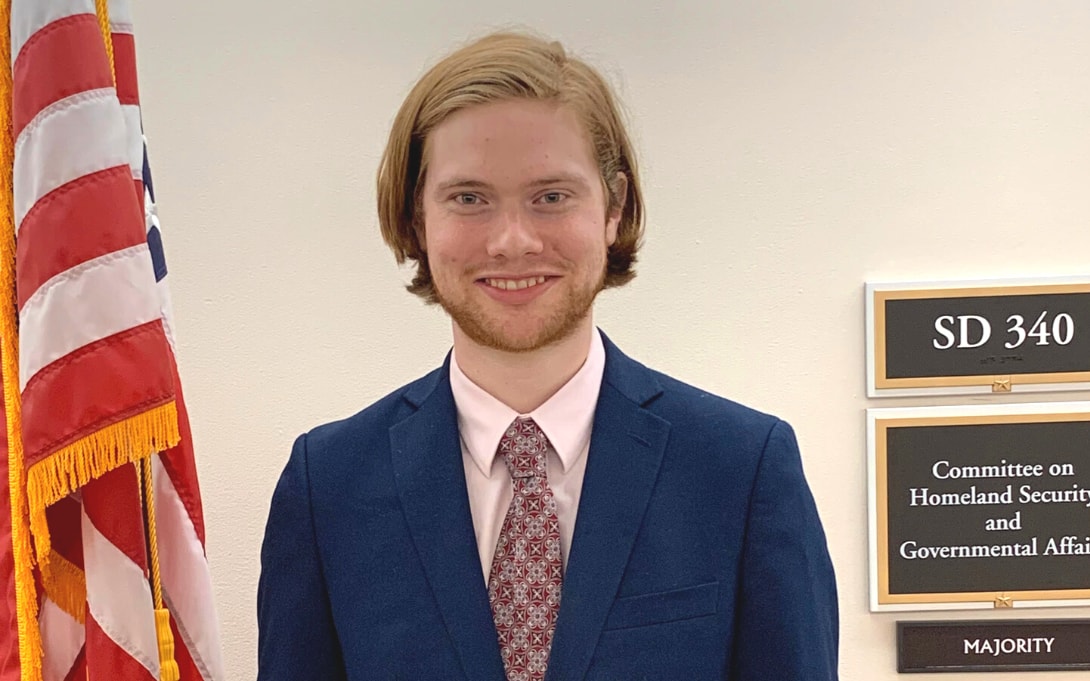
A self-described “good government geek,” James Hiebert (MPP ‘23) recognizes the divide that often exists between local and federal government. So, he jumped at the opportunity to be a Riecker Fellow and to bring his experience in local government to Capitol Hill.
Since 2016, the Ford School’s Riecker Michigan Delegation Fellowship has sent graduate students to work with a U.S. senator or representative from the state of Michigan for six months. Fellows also work with a leadership coach during their time in DC and participate in other leadership programming when back on campus. Hiebert is currently in DC, working for U.S. Senator Gary Peters on the Homeland Security and Governmental Affairs Committee.
“It’s a privilege to be able to work on behalf of other people on important issues,” Hiebert said. “I feel it's the right thing to do, something I feel a responsibility to do, and it's a tremendous privilege to get to work on these issues.”
The committee focuses on oversight of the federal government, what federal agencies are doing, and more. As a committee staffer, Hiebert gets to focus on his interests in tax, health, human services, and data policy and put his previous experience working for the City of Philadelphia and the Iowa Department of Public Health to good use.
“Few people here have worked in local government,” Hiebert explained. “It’s an opportunity to come in as a fellow and say, ‘Hey, I have experience. I worked for three years in a mayor's office. I want to share with you the challenges that we faced in local government, getting access to federal data, applying for grants, and thinking about financial management.’ Those are things that it just feels really worthwhile to be here for, to get to share those experiences and share that knowledge.”
Currently, Hiebert is diving into how the federal government allocates grants. Last year, the federal government gave out $1.13 trillion in grants to support anything from scientific research to foster care programs.
“The [grant] application process is very challenging so my research focuses on listening to understand their experience, to understand this complicated thicket of financial management and also to understand whether the federal government is complying with the GREAT Act, which was meant to change the way in which grants are administered and recorded,” Hiebert said.
With all the Congressional resources at his disposal, Hiebert says he enjoys connecting with people who understand the policy landscape, whether at the Congressional Research Service, interest groups, or lobbyists.
He’s also taking advantage of his time in DC to better understand the workings of the federal government firsthand and bring his perspective of local governments to a larger stage.
“I’m tremendously fortunate for the opportunity to get to bring my previous set of skills, development of local government and development of social science, and apply them in this new federal setting,” he said. “There's no way that it would have happened without this fellowship opportunity.”
The Riecker Michigan Delegation Fellowship, a permanently endowed fellowship at the Gerald R. Ford School of Public Policy, was established in 2015 through an estate gift from Margaret Ann “Ranny” Riecker, a longtime friend and generous benefactor of the Ford School. An additional gift from the Harry A. and Margaret D. Towsley Foundation has allowed the Ford School to extend the opportunity to additional fellows each year.